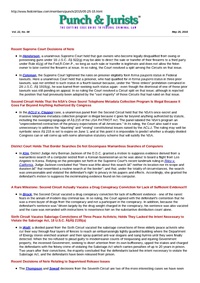Loaded on
June 29, 2015
published in Punch and Jurists
May 25, 2015
In this case, a unanimous Supreme Court tightened the rules for allowing federal prisoners to file lawsuits without paying filing fees. It did so by adopting a narrow interpretation of a provision in the Prison Litigation Reform Act (“PLRA”) which grants in forma pauperis status (“IFP”) to Federal prisoners …
Loaded on
June 29, 2015
published in Punch and Jurists
May 25, 2015
Under 18 U.S.C. § 922(g), it is unlawful for a person who has been convicted of a felony to possess a firearm. The question raised by the instant case was whether that prohibition categorically prevents a court from approving a convicted felon’s request, under Rule 41(g) of the Fed.R.Crim.P. …
Loaded on
May 25, 2015
published in Punch and Jurists
May 25, 2015
In this 97 page blockbuster decision at the intersection of politics, the Constitution and America’s War on Terror, the Second Circuit has ruled that the National Security Agency’s (NSA) once secret, but giant, bulk metadata telephone collection program (herein the “telephone metadata program”) is illegal because it exceeds the …
Loaded on
May 25, 2015
published in Punch and Jurists
May 25, 2015
U.S. v. Thompson, 777 F.3d 368 (7th Cir. Jan. 13, 2015) (Judge Richard A. Posner)
U.S. v. Sewell, 780 F.3d 839 (7th Cir. March 13, 2015) (Judge Michael S. Kanne)
These two decision reflect a growing judicial recognition that “supervised release as it is designed and administered has turned …
Loaded on
May 25, 2015
published in Punch and Jurists
May 25, 2015
U.S. v. Thompson, 777 F.3d 368 (7th Cir. Jan. 13, 2015) (Judge Richard A. Posner)
U.S. v. Sewell, 780 F.3d 839 (7th Cir. March 13, 2015) (Judge Michael S. Kanne)
These two decision reflect a growing judicial recognition that “supervised release as it is designed and administered has turned …
Loaded on
May 25, 2015
published in Punch and Jurists
May 25, 2015
Reading this case, it is really hard to decide which part of the Government’s actions were more painfully embarrassing: its mortifying and pathetic inability to guard and defend a building in Oak Ridge, Tenn., where its stored highly enriched uranium materials - or its vindictive attempt to then prosecute …
Loaded on
May 4, 2015
published in Punch and Jurists
May 25, 2015
In its landmark decision in Riley v. California, 573 U.S. ___, 134 S. Ct. 2473 (2014), the Supreme Court addressed for the first time the question of whether the police may conduct a warrantless search of digital information stored on a cell phone of a person who has been …
